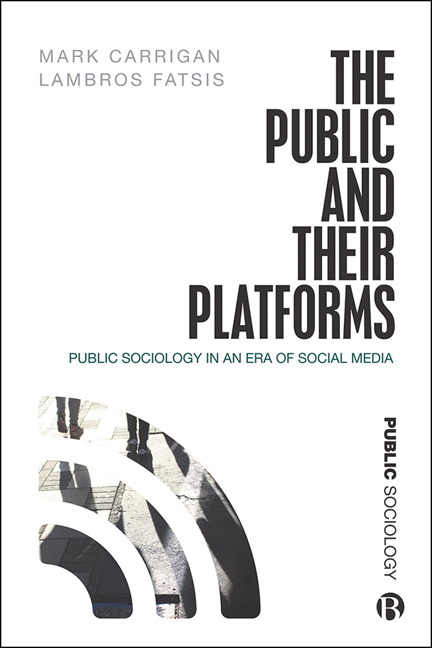Book contents
- Frontmatter
- Contents
- Acknowledgements
- Series Editors’ Preface
- Introduction
- 1 Defining ‘the Public’
- 2 The History of Platforms
- 3 Between Publics and Platforms
- 4 Sociology and its Platforms
- 5 The Past, Present and Future of Public Sociology
- 6 Making Sociology Public
- 7 Making Platforms Public
- 8 Assembling Public Sociology
- Notes
- References
- Index
3 - Between Publics and Platforms
- Frontmatter
- Contents
- Acknowledgements
- Series Editors’ Preface
- Introduction
- 1 Defining ‘the Public’
- 2 The History of Platforms
- 3 Between Publics and Platforms
- 4 Sociology and its Platforms
- 5 The Past, Present and Future of Public Sociology
- 6 Making Sociology Public
- 7 Making Platforms Public
- 8 Assembling Public Sociology
- Notes
- References
- Index
Summary
In recent years, the term ‘platform’ has become ubiquitous, taken up by both business gurus and critical social scientists in a way liable to leave many suspicious of what appears to be a passing fad. It is a slippery term, trading off a range of connotations which are not always apparent to speakers, helping social media firms shield themselves from their responsibilities as gatekeepers of our media ecosystem at the same time as being used to analyse the business model and hold the firms behind the platforms to account. But it is nonetheless a useful word because it identifies a significant change in how digital technology is being deployed within social life, underscoring a turn towards an approach which has rapidly become ubiquitous.
The utopian ambitions which defined the internet as it grew revolved heavily around virtuality, the possibility of escape from the mundane constraints of the physical world and the promise of a better world which could be built beyond them. As John Perry Barlow ([1996] 2019) put it in his A Declaration of the Independence of Cyberspace, these pioneers saw themselves as building a world where ‘all may enter without privilege or prejudice accorded by race, economic power, military force, or station of birth’ and where ‘anywhere may express his or her beliefs, no matter how singular, without fear of being coerced into silence or conformity’. The fact it was published from Davos, at the World Economic Forum where Barlow was an invitee alongside other ‘digerati’, detracts slightly from the epochal character of his declaration and his frustration at the ‘self-congratulatory arrogance of my hosts’ could easily be levelled at the man himself (Barlow 2006). But it nonetheless captured an ethos which was pervasive, with its resonant condemnation of ‘weary giants of flesh and steel’ who failed to understand this brave new world which they sought to regulate. He was far from the only prophet of an internet age. Figures such as Stewart Brand, with his often repeated yet little contextualized soundbite that ‘information wants to be free’, reflected the ethos which was emerging among digital pioneers while also giving it further shape.
- Type
- Chapter
- Information
- The Public and their PlatformsPublic Sociology in an Era of Social Media, pp. 55 - 78Publisher: Bristol University PressPrint publication year: 2021



